Bu içerik, Sara Sharif’in trajik hikayesini anlatmaktadır. İçerik, Sara’nın acı dolu yaşamının detaylarını ve çocuk koruma hizmetlerinin, polisin ve okulun Sara’ya yardım etmekte başarısız olduğu durumları içermektedir. Sara’nın ailesinin şiddet dolu yaşamı ve sonunda Sara’nın ölümüne yol açan vahşi eylemler detaylı bir şekilde anlatılmaktadır. Olayların incelenmesi ve nasıl önlenebileceği konusunda yapılan çalışmalara da değinilmektedir. Sara’nın sevdiği şeyler ve hayalleri ile ilgili anekdotlar da içeriğin duygusal yönünü oluşturmaktadır.
[ad 1]
Kaynak: www.bbc.com

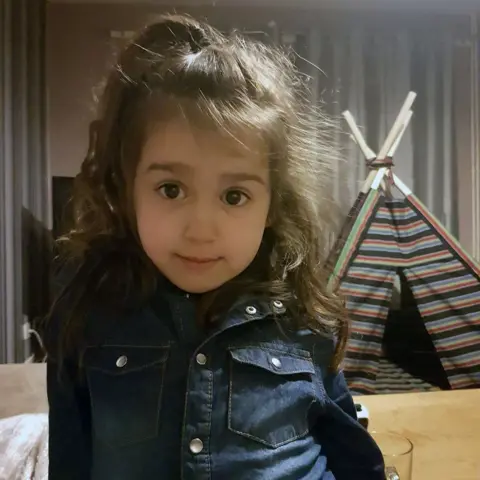 BBC
BBCIt was at 2.47am on 10 August last year when Surrey Police received a call from Islamabad airport in Pakistan.
“I’ve killed my daughter,” said the man on the end of the phone, sobbing loudly. “It wasn’t my intention to kill her, but I beat her up too much.”
He told the police call handler he had only meant to punish her. “I’m a cruel father,” he added.
The man on the phone was Urfan Sharif.
By the time the call was over PC George Van Der Wart was knocking on the door of the Sharif family home in Woking.
Warning: This article contains graphic descriptions of physical abuse
In a bedroom at the top of the stairs, he found the body of Sharif’s 10-year-old daughter Sara on the bottom bunk, under the covers.
Next to the pillow was a note in Sharif’s handwriting in which he said he had beaten and killed his daughter. “I lost it,” he wrote.
Post-mortem examinations showed Sara had died from a constellation of injuries and neglect. Her body was covered in bruises, she had a traumatic head injury, human bite marks and multiple broken bones. She had been burned by a domestic iron.
A search of the house and garden revealed – among other things – homemade hoods made of plastic bags and packing tape, as well as a cricket bat with Sara’s blood on it. It was a brutal end to the life of a girl remembered by her former class teacher as spirited, sassy, bubbly, and whose happy place was being on the stage.
Sara had loved playing the guitar and dreamed of being on the X Factor. Her favourite colour was pink, and her favourite food was chicken biryani.
Beaten, burned and bitten
An Old Bailey jury has now found Sharif and Sara’s stepmother, Beinash Batool, guilty of murder. Her uncle, Faisal Malik, was cleared of her murder, but found guilty of causing or allowing the death of a child.
During the eight-week trial, a picture was painted of a young girl who was let down by those closest to her – the people she should have been able to trust.
Sara was often pictured smiling in photographs, yet at home she was being beaten, burned and bitten.
The trial would show again and again how Surrey County Council’s children’s services, Surrey Police and her primary school were all aware of concerns about her family, but none was able to offer a lifeline to Sara.
Now, following a legal case brought by BBC News and other media, we can report much more detail of the involvement of the council and the family courts in Sara’s life.
A girl who was in foster care twice by the age of three, Sara was surrounded by violence for all of her short life.

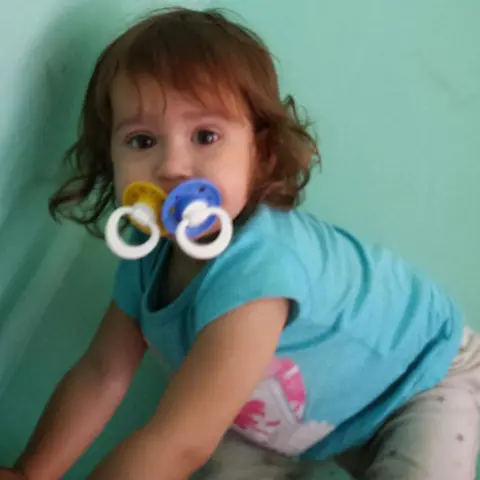
Sara Sharif was born on 11 January 2013 at Wexham Park Hospital, in Slough.
Her father had come to the UK from Pakistan to study. He married Sara’s mother, Olga Domin – who was Polish and spoke little English – in Woking, in 2009.
Before Sara was even born, the family was known to police and children’s services. Records show police were involved four times between 2010 and 2012.
Surrey County Council children’s services were in contact from 2010, while hearings at the family court, in Surrey, began just before Sara was born.
This was because of growing concerns of neglect and violence in the family, including against one of Sara’s siblings, referred to in court as “Z”.
In 2010, “Z” was found alone in a shop aged just three. Later that year Sharif was arrested for assaulting Ms Domin. During the fight he hit “Z”, leaving a hand print on the child’s back.
In 2011, “Z” told teachers “daddy hit me”, and the following year told them “mummy hit me”. The child was found with a burn mark and was again discovered alone in public, this time in Woking Town Centre – half a mile from the family home.
Social workers recorded “unexplained injuries” to “Z” and another of Sara’s siblings, referred to in court as “U”. Before Sara was born there were further allegations of assaults against the children, all were denied.
Then there was an incident in 2013, when “Z” was burned by an iron. When social workers visited their home, they found no light bulbs or bedding in the children’s bedrooms.
This meant Sara was under a care order soon after she was born. It gave the local authority legal responsibility for Sara and her two siblings, and social workers made frequent visits to the family home.
She was first taken into foster care for a short period in November 2014, when she was almost two, after “Z” complained of being bitten “very hard” by Ms Domin and “pinched and punched” by Sharif.
Foster carers noticed what looked like cigarette burns on both Sara and “U”. Ms Domin and Sharif said they were chicken pox scars.
In 2015, in the middle of the care proceedings hearing, Ms Domin accused Sharif of hitting her and their children, and of controlling and violent behaviour. These allegations were never tested in court, but Sharif agreed to go on a domestic violence course.
False imprisonment
Surrey Police were also aware of previous allegations of violence made against Sharif. Two ex-girlfriends accused him of false imprisonment, in 2007 and in 2009.
After the initial period in foster care in late 2014, Sara who had still not yet turned two, returned home with “U”. However, “Z” never went back to the family, instead remaining in care.
The following year Sara was briefly in foster care again, this time when her mother left the family home alleging domestic violence. When her parents formally separated, she started living with her mother, first at a women’s refuge. Sharif was only allowed supervised contact.

 Surrey Police
Surrey PoliceDuring her murder trial, the jury heard from one of the social workers involved with Sara’s case. In his notes, he recorded that when Sharif went over to Sara during one session, she shouted at him to “go away”. He also noted that “U” said Sharif “hit mummy in the mouth and made her bleed.”
Before Sharif split up with Sara’s mother, he met another woman, Beinash Batool, who was a customer at his taxi business.
For the next few years Sara stayed living with her mother, and things seemed to have calmed down. But in Easter 2019, Sharif said Sara had told him Ms Domin had been violent to her.
Family court documents recorded how Sara said her mother had tried to drown her and burn her with a lighter. She also said her mother had slapped her, pinched her, and pulled her hair. Sharif recorded some of the allegations in a video.
It is not clear if he had encouraged Sara.
For the second time since Sara was born, social services became involved, this time in assessing who she should live with. Despite Sharif’s previous history of violence, a social worker recommended that Sara and “U” should move back in with him.
In October 2019, Guildford’s family court agreed that Sara should return to live with her father and Batool, her new stepmother.
The judge who made the decision was the same one who had been involved in the hearings from 2013 to 2015, and was aware of all the previous allegations.
Ms Domin, who consented to the arrangement, was to have contact for two hours every Saturday, supervised by Batool. This later broke down, ending Sara’s contact with her mother.
By this time Sharif and Batool were living in a small ground floor flat in West Byfleet, and Sara started going to the local St Mary’s Primary School.
But it was clear to those on the street that all was not well in the house. One upstairs neighbour, Rebecca Spencer, described them as a “nightmare family”. She told the court she heard banging and hysterical screaming.
On one occasion, when it reached “fever pitch”, she told jurors she had gone to the address to ask if everything was OK. Batool told her “yes, yes” before she “had the door shut in my face”.
Covered in bruises
Another neighbour, Chloe Redwin, told the court she heard frequent smacking and yelling, as well as Batool swearing. She said the only time it was quiet was when they were away on holiday.
The court heard none of the neighbours was worried enough to call the police or social services.
In December 2020, Batool sent her sister Qandeela Saboohi some pictures of Sara with obvious serious bruising to her arms and face.
Over the next two years she sent frequent messages to her sisters about Sharif “beating the crap out of Sara”, leaving her “covered in bruises” and unable to walk. She claimed that one night Sharif kept Sara up all night doing sit-ups.
In one message she said she had had to push Sharif out of the way to save Sara. Neither Batool nor her sisters called the police or social services.
Batool told her family Sara was being bullied at school. Her class teacher Helen Simmons remembered that she “didn’t keep friends very easily”, but said Sara “loved to be on the stage and singing and performing – that was her happy space”. Sara also enjoyed being a member of the “Cool Carers’ Club” for children who take on more responsibility at home.
Her headteacher, Jacquie Chambers, recalled Sara as an “absolute chatterbox” who dreamed of being on The X Factor.
“We’ll always remember her as that really confident, very smiley, full of energy and life little girl. She was a really vibrant, big character. And she would talk the ear off anyone who would listen.”
Concerns grew about Sara in June 2022 when she was taken out of school to be home-schooled.
“It was a cause for concern because it fell very much out of the blue,” Ms Simmons told the trial. Sara returned for the new academic year in September.
It was around this time that Sara started wearing a hijab. In a home video in July 2022, which was shown to the jury, Sharif was seen slapping Sara four times on her cheeks.

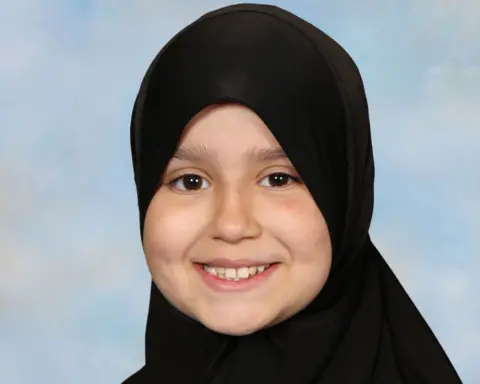 Surrey Police handout
Surrey Police handoutDespite the hijab covering much of her head, by March 2023 Ms Simmons was seeing injuries on Sara’s face. First, on 10 March, she saw a bruise on the underside of her chin and one on her cheek.
“They didn’t look like fresh bruises,” she said. Sara said she had fallen over on some roller-skates, but her account seemed inconsistent. She told one school friend she had fallen off her bike.
The school was worried enough that they referred the incident to social services. For the third time, Surrey County Council’s children services became involved in Sara’s case. After a six-day investigation, the council told the school no further action was being taken, but asked the school to “monitor” the situation. This was despite the council knowing the long history of allegations of violence in the family, and the involvement of the police as far back as 2010.
The school also recorded that Batool was seen using very explicit and abusive swearwords in Punjabi during the school drop-off, the court heard.
On 28 March, Sara came to school with another bruise. Batool told Ms Simmons the injury had been caused by a pen. All this was again meticulously recorded by St Mary’s.
The following month the family finally moved out of the tiny two-bedroom council flat with a shared garden in West Byfleet, to a bigger semi-detached house in Woking, also owned by Surrey County Council. Faisal Malik, Sara’s uncle, had been living with the family for about four months by this point, and he also moved into the new house.
From this moment Sara never went back to school. Sharif wrote a cursory email to St Mary’s saying that his daughter was being home-schooled again.
Any chance of the school monitoring Sara was now over.
‘He beat her up like crazy’
Judy Lozeron lived next door to the Sharifs in Woking.
She often watched Sara in the garden, quietly looking after the baby of the family while the other children played.
“She seemed to be very attached to the baby,” she said.
But she never spotted any signs of injury, and never heard any shouting or arguing in the house next door. The only thing she noticed was Sara’s demeanour.
“I didn’t see her smile, and I think that is strange, but there was no reason for us to suspect anything else.”
On 25 May, another message about Sara from Batool to her sister read: “He beat her up like crazy. Her oxygen level dropped really low, she’s finding it hard to stay awake. She’s breathing really, really rapidly.”
As the summer wore on, largely out of earshot of the neighbours, the torture of Sara accelerated. In the last few weeks of her life she was bitten, branded on her bottom with an iron, and hooded with plastic bags held in place by packing tape.
Sharif admitted hitting her with a cricket bat and beating her with a white metal pole that was part of a high chair. He also hit her over her head with a mobile phone. But the bites marks on her body didn’t match Sharif’s dental impressions, the court was told. He denied burning Sara with an iron.

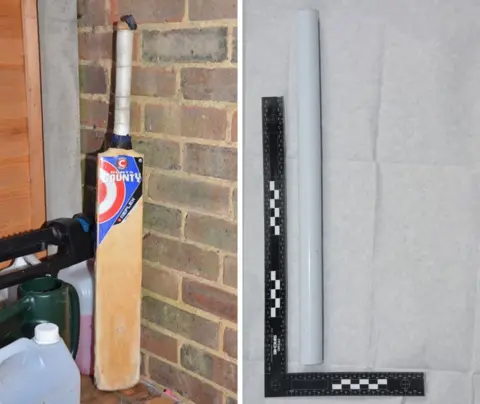 Surrey Police
Surrey PoliceSara had started vomiting and was wearing a nappy because she was soiling herself. In those last few weeks she sustained at least 25 broken bones and a traumatic brain injury.
At no point was she ever taken to hospital.
One afternoon in early August, Fiona Mellon, whose back garden overlooked the Sharifs’, heard a piercing scream that suddenly cut short.
On Sunday 6 August 2023, Sara was filmed at home by Batool dancing in front of the TV, seemingly OK. Later that day her stepmother’s lawyer said her father beat her again.
On Tuesday 8 August, Sara’s body could take no more and she started to visibly deteriorate. Sharif decided she was pretending and hit her again on her stomach with the metal pole.
Later that night “U” texted a friend:
“Hello”
“Urgent”
“My sister just passed away”
When Sara died, it was the end of a life in which violence had become completely normalised, the prosecution told the trial.
Social services had been intermittently involved with the family for 13 years; her father had been arrested at least three times for violence against adults; and her school had raised concerns about bruising. It leaves questions about whether her death could have been avoided.
One key question is whether there should be a better way of monitoring pupils about whom there are concerns when they are taken out of school.
Annie Hudson, who chairs the Child Safeguarding Practice Review Panel for England, said vulnerable children can be more at risk when pulled out of school.
“They are out of sight, they don’t have the protective care of being in school, and all that brings,” she added.
In the immediate aftermath of Sara’s death, Surrey County Council commissioned a rapid review of its involvement with her.
This led to a more detailed local child safeguarding review, which is now looking at the roles of Surrey Police, St Mary’s Primary School, the NHS and Surrey County Council.
It will investigate the on-and-off engagement with Sara by children’s services, which started before she was born.
The review will look at the six-day investigation into the bruising seen by Sara’s class teacher five months before she died. That investigation did not result in any action by the county council against the parents, despite their knowledge of the Sharif’s violent history, just a suggestion the school monitor Sara.
But the teachers were unable to do that once Sara was taken out of school.
Rachael Wardell, executive director for children, families and lifelong learning at Surrey County Council, said: “We are resolute in our commitment to protecting children, and we are determined to play a full and active part in the forthcoming review alongside partner agencies, to thoroughly understand the wider circumstances surrounding Sara’s tragic death.”
She said the complete picture would only be clear when the independent safeguarding review concludes.
“Sara’s death is incredibly distressing and we share in the profound horror at the terrible details that have emerged during the trial. We cannot begin to comprehend the suffering that poor Sara endured.”
A polka-dot painted bench now stands in the playground of Sara’s old school. It has a plaque on it which reads: Sara’s buddy bench.
Ms Chambers, the headteacher, said Sara was “such a special little girl”. “It’s hard to put into words actually,” she added. “I don’t think I’ve ever known such sadness.”
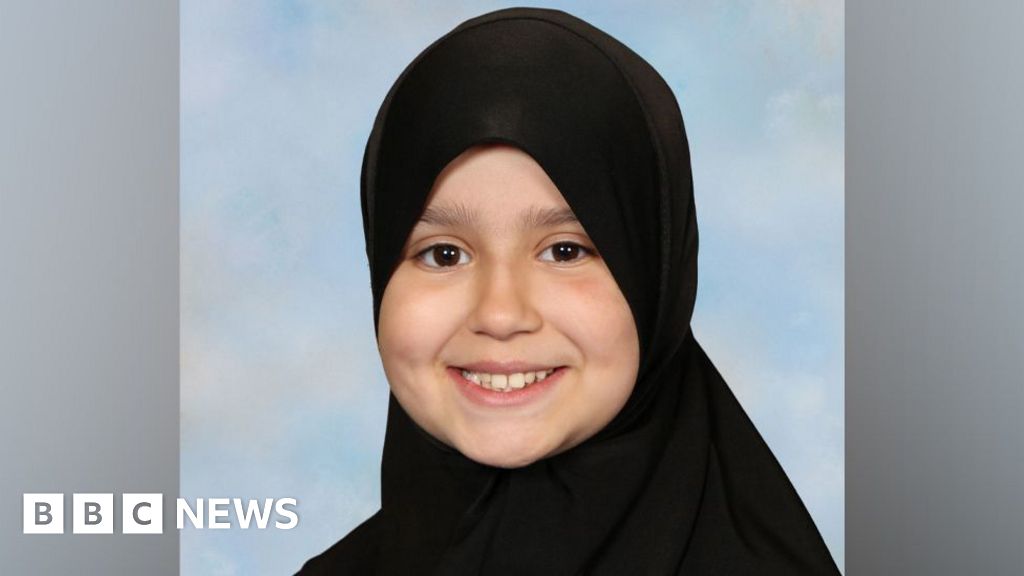





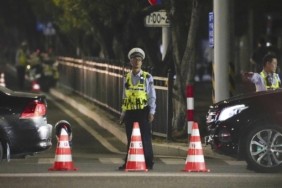
Yorumlar kapalı.